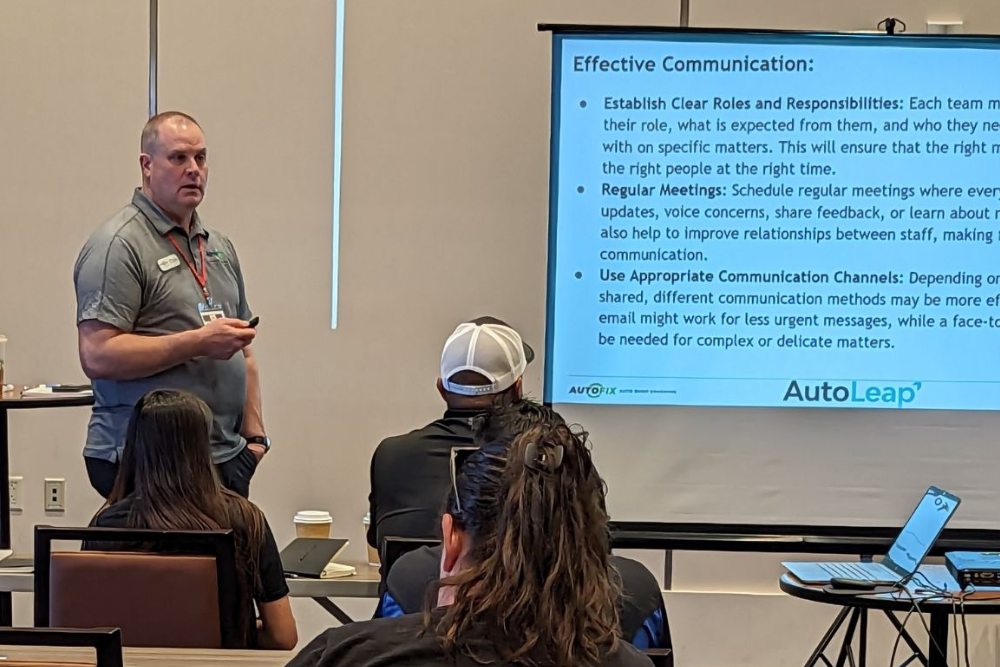
The auto repair industry is more complex than ever, and customers expect more than just quality repairs—they want an exceptional customer experience. Personalized communication has become a crucial factor in building trust, ensuring transparency, and creating long-term customer relationships.
For auto repair shop owners, mastering automotive customer service isn’t just about answering questions—it’s about educating customers, setting realistic expectations, and making them feel valued. When done right, it can increase customer retention, improve online reviews, and drive revenue.
Understanding the Modern Auto Repair Customer
Customers today have more access to information than ever before. They research online, read reviews, and expect clear communication from service advisors. However, many don’t fully understand how modern vehicles are designed and repaired, which can lead to misunderstandings about pricing and labor time.
Kacie Presnall, office/service advisor at Yocum Automotive, was a recent guest on Chris Cotton’s AutoFix Advisor Cast and perfectly summed up this challenge:
“Vehicles now are not engineered from the perspective of being worked on, so the repairs before that were an hour—a simple starter, alternator, battery—some of those are now two, three hours depending on how a vehicle has been engineered and designed and where the location of those items are. Headlights–that’s a huge deal. A headlight used to be a three/tenths job all day long, and now we have headlights that are two hours. You’re pulling the bumper off, recalibrating things, and so it’s just not really designed for being repaired, so that, of course, drives up all those prices”
This is where personalized communication is essential. Service advisors must break down these complexities in a way that reassures and educates customers, helping them understand repair times and costs.
Five Strategies to Improve Personalized Communication in Your Auto Shop
1. Train Your Service Advisors for Exceptional Customer Interactions
Your service advisors are the face of your auto repair business. They must be equipped with service advisor training that helps them effectively communicate with customers.
Best practices for service advisors:
- Use the customer’s name and recall details from past visits to build rapport.
- Simplify technical explanations so they are easy to understand.
- Be upfront about labor time and costs to avoid surprises.
- Show empathy and patience when addressing concerns.
Proper automotive customer service training ensures that your team delivers a consistent, high-quality customer experience that builds trust and loyalty.
2. Be Transparent About Repair Costs and Time Estimates
One of the biggest frustrations customers face is unexpected costs or long repair times. Because modern vehicles are more complex, pricing transparency is essential.
How to improve price communication:
- Offer digital or printed estimates with a breakdown of parts and labor.
- Use videos or diagrams to help explain why certain repairs take longer.
- Provide options when possible, allowing customers to choose based on their needs and budget.
3. Use Follow-Ups to Strengthen Customer Relationships
A follow-up after service shows customers that your business truly cares. This small effort can lead to increased trust and repeat visits.
Effective follow-up strategies:
- Send a personalized email or text thanking them for their visit.
- Check in a few days later to see if the vehicle is running smoothly.
- Offer a discount or special offer for their next visit to encourage repeat business.
Personalized follow-ups create a lasting impression and increase customer satisfaction.
4. Leverage Technology to Enhance Personalized Communication
Technology can make personalized communication more efficient while maintaining a human touch.
Ways to use technology in automotive customer service:
- CRM software to track customer history and tailor interactions.
- Automated appointment reminders via text or email.
- Digital vehicle inspections with real-time photos and videos.
Using technology ensures customers feel informed and involved in the repair process.
5. Create a Customer-Centric Culture in Your Shop
The most successful auto repair businesses don’t just fix cars—they build relationships. A customer-first culture ensures that every interaction is centered around trust, transparency, and excellent service.
Ways to foster a customer-centric culture:
- Train your team to listen actively and respond thoughtfully.
- Encourage service advisors to personalize recommendations based on driving habits.
- Offer small comforts in your waiting area, like coffee or Wi-Fi, to improve the in-shop experience.
When customers feel valued, they are more likely to return and refer others to your shop.
How AutoFix Auto Shop Coaching Can Help
At AutoFix Auto Shop Coaching, we provide real-world, personalized coaching tailored to independent auto repair shops. With expertise rooted in industry experience, we help shop owners improve service advisor training, enhance automotive customer service, and optimize business operations for long-term success.
Our comprehensive approach covers everything from financial management to customer communication, ensuring your shop runs efficiently and profitably. More than just coaching, we offer a community of forward-thinking shop owners committed to growth. With our guidance, you won’t just compete—you’ll lead the pack.
Take Your Auto Shop’s Customer Communication to the Next Level
If you’re ready to enhance service advisor training, improve your customer experience, and grow your auto repair business, contact AutoFix Auto Shop Coaching today.
Call (940) 400-1008 or schedule now online to start transforming your customer interactions.